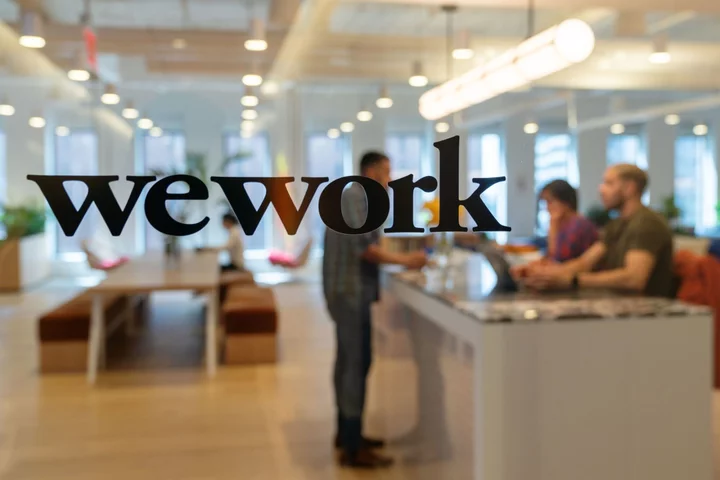WeWork Inc.’s collapse is spreading through the battered commercial real estate industry, threatening to upend dozens of leases in cities including New York and San Francisco.
The coworking giant’s spiral into bankruptcy hit landlords along the way as it renegotiated and sought to exit many leases. Now, the bankruptcy filing Monday and a plan to terminate nearly 70 of those contracts is set to exacerbate the issues facing many of WeWork’s landlords: The tenant wants out and could have more power to leave.
“It’s a lot of space potentially coming on the market,” said Ruth Colp-Haber, chief executive officer of Wharton Property Advisors. “Some of them will be taken by other coworking operations, but a lot will not be of interest. Those buildings are going to be pushed into serious problems.”
Office owners have been grappling with a slowdown spurred by higher borrowing costs that are pressuring building values, as well as a shift in tenant demand with the rise in remote work. Office prices have tumbled 21% in October from a year earlier, according to real estate analytics firm Green Street.
WeWork’s pullback is a significant blow to the market given the sheer breadth of its presence. The coworking company holds the leases for nearly 4.2 million square feet (390,000 square meters) of real estate in Manhattan, according to data from Savills Plc.
Boston Properties Inc., a landlord that counts WeWork as a tenant, has been warning that WeWork’s pullback could be a drag on its occupancy levels in 2024. The property owner said earlier in November that it expects to see more WeWork defaults through the fourth quarter and into 2024.
This week, WeWork filed to terminate nearly 70 leases in the US and Canada. Properties hit include San Francisco’s 1455 Market St., and Los Angeles’s Pacific Design Center.
A spokesperson for the San Francisco landlord, Hudson Pacific Properties Inc., didn’t immediately return a request seeking comment. A representative of Cohen Brothers Realty, which owns the Pacific Design Center, didn’t reply to requests for comment.
Heightened Leverage
Even landlords not targeted in this recent list could face more pressure. The bankruptcy filing will give WeWork more room to try to renegotiate leases, according to Colp-Haber.
“Now WeWork has this incredible leverage to go to the landlord and say, ‘If you’re not going to renegotiate the lease and reduce the rent, we’ll reject this lease,’” Colp-Haber said. “This bankruptcy gives them just a whole new platform for reworking their business.”
The drama could also spill over to the commercial mortgage-backed securities market. At least $2.4 billion in CMBS loans counted WeWork as a top five tenant, according to a note in June from Barclays Plc analysts.
Tech Tenants
The decline in demand for offices has fueled more companies looking to sublease, increasing the competition WeWork faced. At the same time, many of its startup clients were struggling with funding given the tech pullback, WeWork CEO David Tolley said in August.
Further pullback by WeWork could make it more challenging for tech startups seeking well-designed and well-located flexible office offerings, according to Gabe Marans, a vice chairman at real estate advisory firm Savills Plc.
“This WeWork news exacerbates that,” Marans said.

